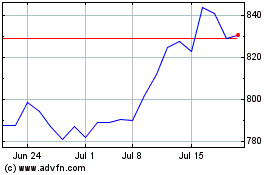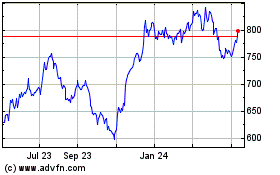ETF 'Heartbeats' Show Influence of Indexes
June 05 2019 - 8:29AM
Dow Jones News
By Asjylyn Loder
A popular BlackRock Inc. exchange-traded fund that tracks
companies with healthy balance sheets shed $1.5 billion on a single
day last week, the largest outflow in its six-year history.
The $10.5 billion iShares Edge MSCI USA Quality Factor ETF
invests in companies that have stable earnings and lower debt
levels. It wasn't that investors suddenly became disillusioned by
such companies. Rather, the outflows were just one leg of a $3
billion two-way trade that began days earlier, and had little to do
with market sentiment.
The real force behind the trade wasn't an investor at all. It
was index provider MSCI Inc. Popular benchmarks created by one of
the world's largest index providers were undergoing their
semiannual rebalancing, triggering massive money shifts as
portfolio managers realigned their holdings with the updated
indexes.
The outsize trades show the power wielded by index providers as
low-cost passive investing gobbles up more and more of the market.
There's now almost as much money in U.S. stock index funds as there
is in the hands of fund managers that try to pick individual
stocks, according to Morningstar.
ETFs aren't necessarily the biggest index investors, but they
are the most visible. Most ETFs disclose their portfolios and
investment flows on a daily basis, unlike mutual funds and big
institutional investors, such as pensions and insurance companies
who use the benchmarks as performance yardsticks.
For ETFs, rebalancing can trigger matching in-then-out trades
that resemble the peaks and valleys on an electrocardiogram,
earning them the nickname "heartbeat flows."
The trades are most often seen in funds that track specialized
indexes where companies are frequently added or dropped from the
portfolio, said Elisabeth Kashner, director of ETF research at
FactSet.
"This is more of a phenomenon not just for indexing, but for
complex indexing where there's a high turnover," she said.
The iShares quality ETF is part of a suite of funds that rely on
so-called smart MSCI indexes that try to pick stocks based on
specific factors. Other funds in the series saw similar outsize
trades. About $230 million made a roundtrip through the iShares ETF
that tries to pick undervalued stocks, and more than $800 million
each way washed through an iShares ETF that invests in stocks that
are less vulnerable to market turbulence.
Portfolio managers use the trades to realign the ETF's holdings
with any changes in the underlying index. For example, the iShares
quality ETF cut its Facebook Inc. holdings, nearly doubled its
shares of 3M Corp., dropped Starbucks Corp. and added Baker
Hughes.
Also called "kickers" or "friendlies," these sizable trades are
typically arranged between portfolio managers and some of the
largest market makers on Wall Street, often big banks that are
comfortable tying up billions of dollars over several days. By
swapping out large blocks of stocks, the ETFs are also able to shed
shares that might otherwise trigger a taxable gain.
Big money shifts don't necessarily mean big price moves,
especially in large U.S. stocks. The changes are typically
understood well in advance, and portfolio managers have plenty of
time to prepare.
To receive our Markets newsletter every morning in your inbox,
click here.
Write to Asjylyn Loder at asjylyn.loder@wsj.com
(END) Dow Jones Newswires
June 05, 2019 08:14 ET (12:14 GMT)
Copyright (c) 2019 Dow Jones & Company, Inc.
BlackRock (NYSE:BLK)
Historical Stock Chart
From Mar 2024 to Apr 2024

BlackRock (NYSE:BLK)
Historical Stock Chart
From Apr 2023 to Apr 2024
